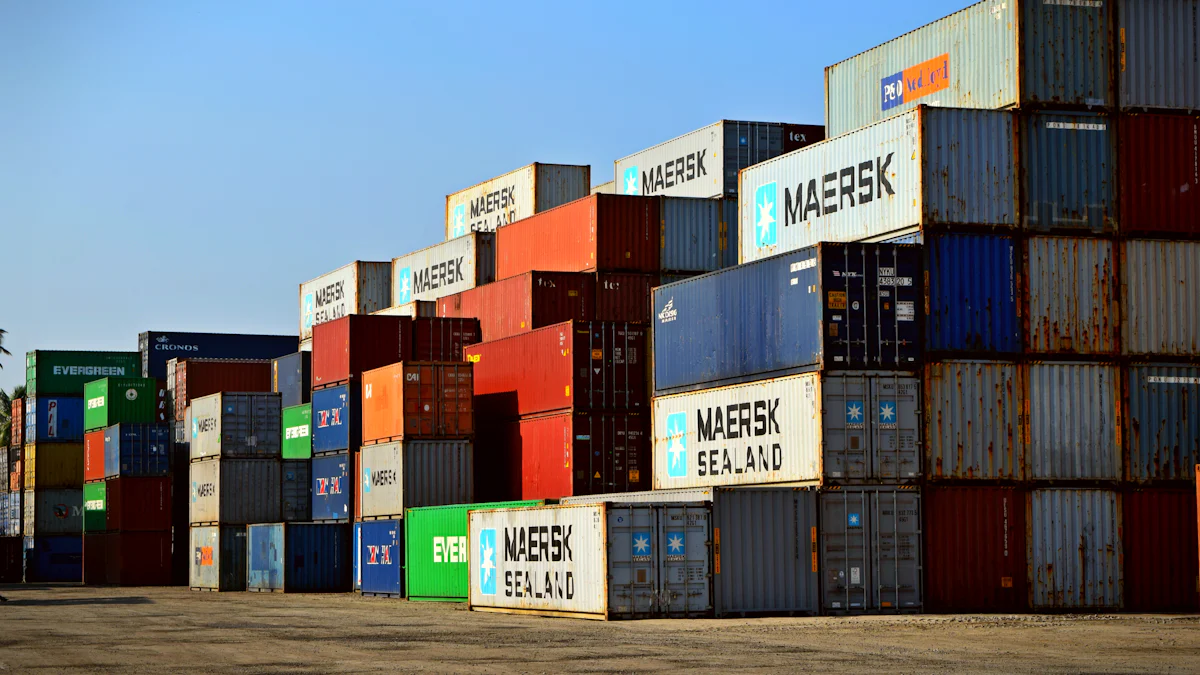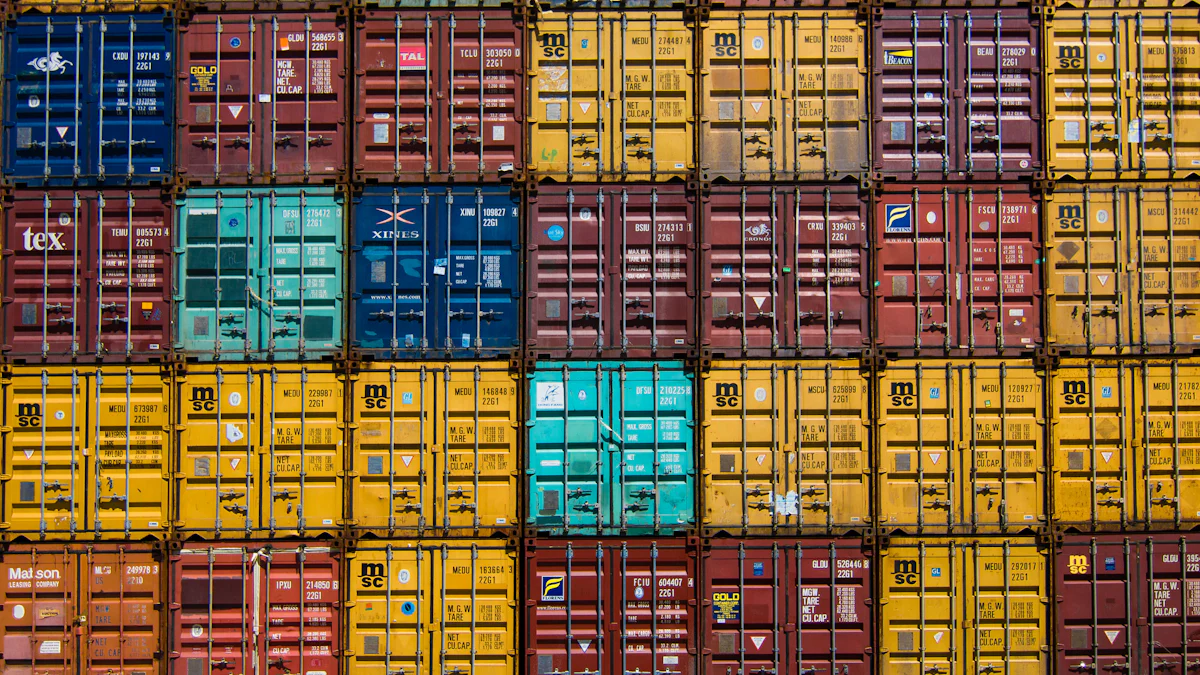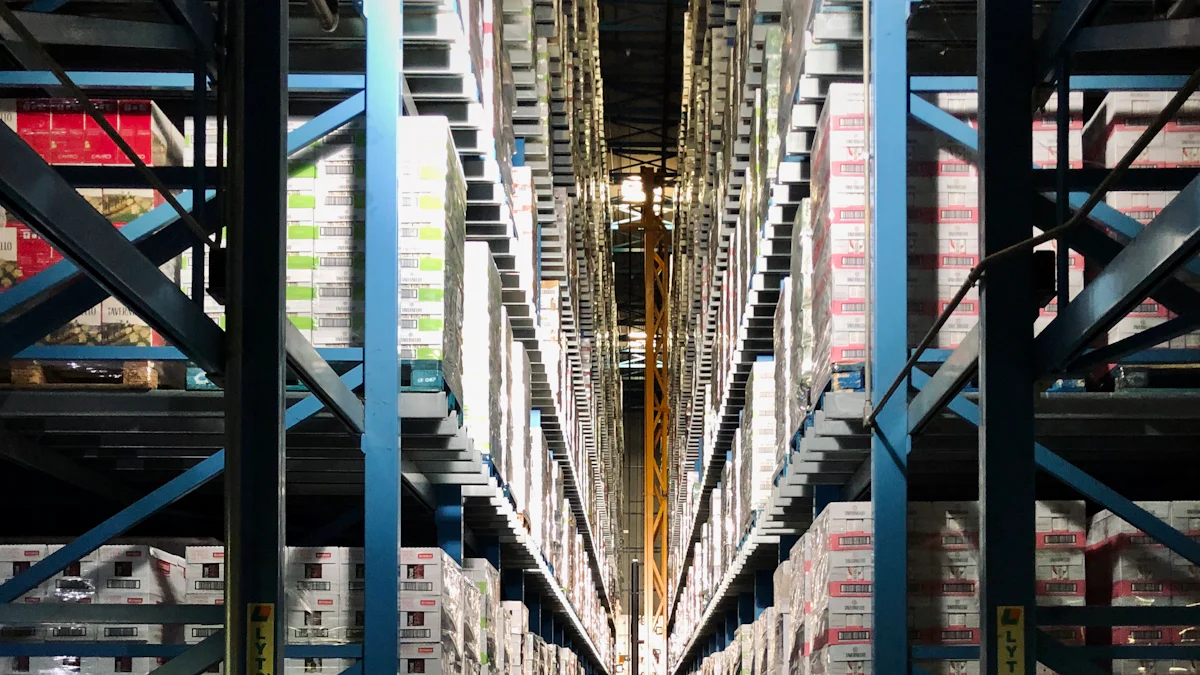Enhancing Logistics with IPI Solutions

Inland Point Intermodal (IPI) solutions revolutionize logistics by seamlessly integrating multiple transportation modes, including freight ocean IPI. You can achieve significant cost savings and efficiency improvements with IPI. For instance, a leading e-commerce company experienced a 40% reduction in transportation costs after transitioning to IPI. This approach optimizes logistics operations by minimizing touchpoints, which reduces handling and transfer costs. Additionally, IPI contributes to environmental sustainability by reducing carbon emissions through the combination of rail and truck transportation. By focusing on inland points, IPI provides enhanced flexibility and access to remote locations, making it an ideal choice for expanding market reach.
Key Takeaways
Inland Point Intermodal (IPI) solutions can lead to significant cost savings, with some companies reporting up to a 40% reduction in transportation costs.
By integrating multiple transportation modes, IPI minimizes handling and transfer costs, streamlining logistics operations for greater efficiency.
Implementing IPI enhances flexibility and reliability, allowing businesses to adapt to market demands and reach remote inland locations.
IPI contributes to environmental sustainability by reducing carbon emissions, making it a responsible choice for modern logistics.
Utilizing advanced technology for tracking and managing shipments is crucial for successful IPI implementation, providing real-time visibility and improving decision-making.
Collaboration among stakeholders is essential for seamless freight transfer, ensuring effective coordination across different transport modes.
Adopting IPI solutions positions businesses to tap into emerging market opportunities, expanding their reach while maintaining cost-effectiveness.
Definition and Overview of Inland Point Intermodal
What is Inland Point Intermodal (IPI)?
Inland Point Intermodal (IPI) refers to a logistics strategy that combines multiple modes of transportation, such as rail and road, to move goods efficiently from coastal ports to inland destinations. This approach allows you to streamline the transportation process by minimizing handling and transfer costs. IPI freight involves the seamless transition of goods from ships to trains or trucks, ensuring that cargo reaches its final destination with minimal delays. By focusing on inland points, IPI provides enhanced flexibility and access to remote locations, making it an ideal choice for businesses looking to expand their market reach.
Historical Context and Evolution of IPI
The concept of intermodal transportation has evolved significantly over the years. In the early days, logistics solutions primarily relied on long-distance trucking, which often resulted in higher costs and environmental impact. However, as the need for sustainable logistics grew in the 2010s, IPI gained traction as a more efficient and eco-friendly alternative. The COVID-19 pandemic further accelerated the adoption of IPI, as businesses sought cost-effective and reliable ways to transport goods amidst global disruptions. Today, IPI stands as a testament to the evolution of logistics, offering a sustainable and flexible solution for modern supply chains.
Importance of IPI in Modern Logistics
IPI plays a crucial role in optimizing supply chain operations. By integrating freight ocean IPI into your logistics strategy, you can enhance cargo delivery efficiency and reduce costs. This method ensures fast delivery of goods, which is essential for maintaining a competitive edge in today's market. Moreover, IPI's focus on inland destinations allows businesses to tap into new markets and reach customers in remote areas. As a result, IPI has become an indispensable tool for companies aiming to improve their logistics solutions and achieve greater operational efficiency.
Key Benefits of IPI Solutions
Cost Efficiency
Reduction in Transportation Costs
Inland Point Intermodal (IPI) solutions offer a significant reduction in transportation costs. By integrating multiple modes of transport, such as rail and road, you can minimize the expenses associated with long-distance trucking. This approach allows for the efficient movement of goods from coastal ports to inland destinations. IPI freight reduces handling and transfer costs, making it a cost-effective transportation option for businesses. You can achieve substantial savings by optimizing logistics operations and minimizing touchpoints.
Economies of Scale
IPI solutions enable you to leverage economies of scale. By consolidating shipments, you can transport larger volumes of goods at a lower cost per unit. This method enhances the efficiency of your supply chain management, allowing you to maximize the use of available resources. As a result, you can achieve greater cost savings and improve the overall profitability of your logistics operations.
Operational Improvements
Streamlined Supply Chain Processes
IPI solutions streamline supply chain processes by integrating various modes of transportation. This approach ensures smooth and fast delivery of goods, enhancing cargo delivery efficiency. By utilizing intermodal transportation, you can optimize your logistics solutions and reduce the complexity of managing multiple transport methods. This integration leads to improved coordination and communication across the supply chain, resulting in more efficient operations.
Enhanced Flexibility and Reliability
IPI solutions provide enhanced flexibility and reliability in logistics operations. By offering multimodal shipping options, you can adapt to changing market demands and ensure timely delivery of goods. This flexibility allows you to reach remote inland locations and expand your market reach. Additionally, the reliability of IPI solutions ensures that your inbound freight arrives at its destination without delays, maintaining customer satisfaction and trust.
Environmental Impact
Reduction in Carbon Footprint
IPI solutions contribute to a reduction in carbon footprint by utilizing more sustainable transportation methods. By combining rail and truck transportation, you can decrease greenhouse gas emissions compared to traditional logistics methods. This environmentally friendly approach aligns with the growing demand for sustainable logistics solutions and helps you meet corporate social responsibility goals.
Sustainable Transportation Practices
IPI solutions promote sustainable transportation practices by optimizing the use of available resources. By reducing highway congestion and enhancing capacity flexibility, you can minimize the environmental impact of your logistics operations. This commitment to sustainability not only benefits the environment but also enhances your brand reputation and appeal to environmentally conscious consumers.
Detailed Process of Freight Ocean IPI Shipping

Understanding the detailed process of freight ocean IPI shipping can significantly enhance your logistics operations. This method involves a seamless integration of various transportation modes, ensuring that goods move efficiently from coastal ports to their inland destinations.
Coordination of Multiple Transport Modes
In freight ocean IPI shipping, you coordinate multiple transport modes to ensure smooth transitions. Initially, goods arrive at seaports via ocean freight transportation. From there, they transfer to intermodal rail or trucks for further movement inland. This coordination minimizes handling and transfer costs, making the process more efficient. By leveraging intermodal transportation, you can optimize the logistics chain, reducing delays and enhancing delivery speed.
Role of Technology in IPI
Technology plays a crucial role in inland point intermodal solutions. Advanced tracking systems provide real-time visibility into shipment status. This transparency allows you to make data-driven decisions, reducing the risk of lost or damaged goods. According to Supply Chain Digital, these systems enhance overall supply chain efficiency. By integrating technology, you can streamline operations and improve communication across different transport modes.
Challenges and Solutions in IPI Shipping
IPI shipping presents several challenges, but solutions exist to address them. Coordinating multiple transport modes can be complex, requiring precise scheduling and communication. However, technology offers tools to manage these complexities effectively. Real-time tracking and monitoring systems help you maintain control over shipments, ensuring timely deliveries. As noted by Forbes, businesses that adopted IPI during the pandemic continue to leverage this method for its flexibility and sustainability. By embracing these solutions, you can overcome challenges and achieve a more efficient logistics operation.
Strategic Implementation of IPI in Supply Chains
Implementing Inland Point Intermodal (IPI) solutions in your supply chain can transform logistics operations. By strategically integrating IPI, you can enhance efficiency, reduce costs, and expand market reach. Here's how you can effectively implement IPI in your supply chain.
Choosing the Right IPI Service
Selecting the appropriate IPI service is crucial for optimizing your logistics operations. Consider the following factors when choosing the right IPI service:
Service Coverage: Ensure the IPI service covers the regions you operate in, including both coastal ports and inland destinations. This ensures seamless transitions between ocean freight transportation and inland transportation.
Cost-Effectiveness: Evaluate the cost-effectiveness of the service. Look for options that offer competitive pricing for intermodal rail and domestic transportation, ensuring you achieve cost-effective inland freight solutions.
Reliability and Flexibility: Choose a service known for its reliability and flexibility. This ensures your inbound freight arrives on time, maintaining customer satisfaction and trust.
Technology Integration: Opt for services that leverage advanced technology for tracking and managing shipments. This enhances visibility and control over your supply chain.
Steps for Successful IPI Integration
Integrating IPI into your supply chain requires careful planning and execution. Follow these steps for successful integration:
Assess Your Current Logistics Operations: Analyze your existing logistics processes to identify areas where IPI can add value. Focus on regions with high transportation costs or inefficiencies.
Develop a Comprehensive Plan: Create a detailed plan outlining how IPI will be integrated into your supply chain. Include timelines, resource allocation, and key performance indicators.
Collaborate with Stakeholders: Engage with stakeholders, including suppliers, carriers, and logistics partners. Collaboration ensures smooth transitions and effective coordination across different modes of transportation.
Implement Technology Solutions: Utilize technology to streamline operations. Implement tracking systems for real-time visibility and data-driven decision-making.
Monitor and Optimize: Continuously monitor the performance of your IPI integration. Use data analytics to identify areas for improvement and optimize your logistics operations.
Overcoming Barriers to Implementation
Implementing IPI solutions may present challenges, but you can overcome them with strategic approaches:
Complex Coordination: Coordinating multiple transport modes can be complex. Use technology to manage schedules and communication effectively, ensuring seamless transitions between ocean freight transportation and inland modes.
Regulatory Compliance: Navigating regulatory requirements can be daunting. Stay informed about regulations affecting intermodal transportation and ensure compliance to avoid delays.
Risk Management: Mitigate risks by identifying potential disruptions in your supply chain. Develop contingency plans to address issues such as delays or capacity constraints.
By addressing these challenges, you can successfully implement IPI solutions and achieve a more efficient and sustainable supply chain.
Case Studies and Real-World Applications
Successful IPI Implementations by JUSDA
JUSDA has demonstrated the transformative power of Inland Point Intermodal (IPI) solutions through successful implementations across various industries. By integrating IPI into logistics operations, JUSDA has helped businesses achieve remarkable results. For instance, a leading e-commerce company experienced a 40% reduction in transportation costs after transitioning to IPI. This significant cost saving highlights the efficiency of IPI freight in optimizing logistics operations.
Another success story involves a manufacturing company that achieved a 25% reduction in inventory carrying costs through IPI implementation. By leveraging intermodal logistics, the company streamlined its supply chain processes, reducing excess inventory and improving cash flow. These examples underscore the potential of IPI solutions to enhance operational efficiency and cost-effectiveness.
JUSDA's expertise in coordinating freight transfer from coastal ports to inland destinations has been pivotal in these successes. By utilizing multiple transportation modes, including freight ocean IPI, JUSDA ensures seamless transitions and timely deliveries. This approach not only reduces costs but also enhances the reliability and flexibility of logistics operations.
Lessons Learned from Industry Leaders
Industry leaders have embraced IPI solutions to overcome logistics challenges and achieve sustainable growth. Their experiences offer valuable insights for businesses considering IPI implementation. Here are some key lessons learned:
Prioritize Technology Integration: Successful IPI implementations often involve advanced technology for tracking and managing shipments. Real-time visibility into shipment status enhances decision-making and reduces the risk of delays or losses.
Focus on Collaboration: Effective coordination among stakeholders, including suppliers and carriers, is crucial for seamless freight transfer. Open communication and collaboration ensure smooth transitions between different transport modes.
Adapt to Market Demands: Flexibility is essential in intermodal logistics. Businesses must be prepared to adapt to changing market demands and explore new inland markets. This adaptability allows companies to expand their reach and maintain a competitive edge.
Commit to Sustainability: IPI solutions contribute to environmental sustainability by reducing carbon emissions. Industry leaders recognize the importance of sustainable practices in enhancing brand reputation and meeting corporate social responsibility goals.
By learning from these industry leaders, you can effectively implement IPI solutions and achieve a more efficient and sustainable supply chain.
Future Trends and Innovations in Intermodal Transportation

Technological Advancements
In the realm of intermodal transportation, technology continues to drive significant advancements. You can expect to see more sophisticated tracking systems that provide real-time updates on shipments. These systems enhance visibility and allow you to make informed decisions quickly. For instance, integrating IoT devices into freight ocean IPI operations can offer precise data on cargo conditions and locations. This technology not only improves efficiency but also reduces the risk of delays or losses during shipping.
Artificial intelligence (AI) is another game-changer. AI algorithms can optimize routes and schedules, ensuring that IPI freight reaches its inland destinations promptly. By analyzing vast amounts of data, AI helps you predict potential disruptions and adjust plans accordingly. This proactive approach enhances supply chain management by minimizing risks and improving final delivery accuracy.
Emerging Market Opportunities
As businesses look to expand their reach, intermodal transportation presents numerous opportunities. The flexibility of IPI solutions makes it easier for you to tap into new markets, especially within the United States. By utilizing domestic transportation networks, you can efficiently move goods from coastal ports to inland regions. This strategy not only broadens your market access but also reduces transportation costs.
Emerging markets in Asia and Africa also offer potential growth areas. With the increasing demand for efficient logistics solutions, IPI can play a crucial role in connecting these regions to global trade networks. By adopting intermodal strategies, you can position your business to capitalize on these expanding markets and enhance your competitive edge.
Predictions for the Future of IPI
Looking ahead, IPI is poised to become an integral part of sustainable logistics. As environmental concerns grow, businesses will prioritize reducing their carbon footprint. IPI solutions, known for their eco-friendly nature, will gain traction. By decreasing the number of trucks on highways, IPI contributes to lower greenhouse gas emissions, aligning with global sustainability goals.
You can also anticipate more collaboration between stakeholders in the supply chain. This cooperation will streamline processes and improve efficiency. As technology continues to evolve, seamless integration across different transport modes will become standard practice. This evolution will ensure that IPI remains a vital component of modern logistics, offering cost-effective and reliable solutions for businesses worldwide.

JUSDA Solutions
To provide you with professional solutions and quotations.
Inland Point Intermodal (IPI) solutions offer a strategic advantage in modern logistics. By integrating rail and truck transportation, you can optimize logistics operations, reduce costs, and improve shipping times. IPI freight minimizes touchpoints, enhancing efficiency and flexibility. This approach not only supports business expansion but also aligns with sustainable practices by lowering carbon emissions. Exploring IPI as a logistics strategy can lead to better business outcomes and increased revenues. Embrace IPI to enhance your supply chain, ensuring exceptional customer experiences and operational insights.
See Also
Transforming Future Logistics With AI Supply Chain Solutions
Unlocking Greater Efficiency Through JUSDA's Logistics Technology
Boosting Warehouse Productivity With Advanced Logistics Robotics
Exploring JUSDA's Innovative Logistics Solutions for Manufacturing
The Transformative Effects of Supply Chain Innovations on Logistics
